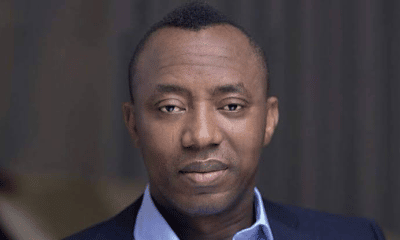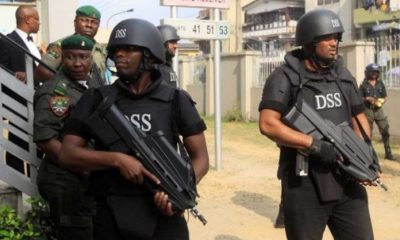Opinion
Extinguish The Rising Flames: The Focus Of A Security Model In Nigeria

As Nigeria continues to battle with complex emergencies, especially in the area of security, actors in all sectors of the social strata must reflect on their approaches to solving problems, review their strategies, and understand the ethical implications of their actions and methods on the exacerbation or de-escalation of growing tensions. It is no longer news that Nigeria struggles to tackle a myriad of security challenges, which threatens the unity of the country. These challenges reveal the gaps embedded in security provisions, the legal quagmire associated with access and administration of justice, and very recently, the alleged security threat posed to state legitimacy by the Revolution Now movement. The complexity of the security challenges across different regions in the country and the attitude of the majority of citizens to security services could portray a deterioration in the level of trust and cooperation. A consideration of the delicateness of security provisions requires relevant actors to review their response to insecurity consistently. These responses must be proactive, participatory, collaborative, and sensitive to the dynamism of the citizens that constitute society.
Nigeria’s authorities, which manages and instructs the security architecture of the country, must prevent the development of a tacit security model that portrays security delivery as favouring selected elites and ignoring the security concerns and needs of the majority of the population. While it is a constitutional responsibility for security services and constituted state authorities to protect the sovereignty and territorial integrity of the country, it will be unethical to ignore the negative implications that a security strategy which does not represent the overall interest of citizens would have on peacebuilding in Nigeria. Alleged human rights abuses, as documented in the World Report 2019, continues to threaten security, rights, and freedom of citizens in a “civilised” democracy. Even at a time when the country strives to clamp down the challenges posed by violent extremism and narratives that radicalise individuals, especially among the youth, security strategies that abuse citizens could create a boomerang effect. These negative repercussions sustain a fertile ground for the protraction of extremism, the radicalisation of more groups, and the mobilisation of rebellion against government authorities. Although authorities could use lethal force to maintain legitimacy, a potential collapse of law and order will put the continuation of national growth in jeopardy, thereby making Nigeria a shadow of itself.
Increased rate of abduction, communal attacks, gangsterism, and ethnocentrism are critical indicators of a high level of unemployment, poverty and hunger, the alleged political marginalisation of minorities, alleged sectional governance, and dissatisfaction of many citizens with the current political leadership in the country. While these issues require an effective and responsive governance strategy to tackle, security services must be pre-emptive to discern the effects of these dilemmas on the security situation across various communities, which is already manifesting within the Nigerian society. When security services are perceived, by citizens, to be buying into the political rhetoric of political actors, public reception of their strategies becomes adversely weak. Discriminatory provision of security poses a massive threat to our collective unity as a country, ignores our social values, and portrays security institutions as selective and political. Hence, new forms of radical ideologies could emerge, further widening the ethnic and linguistic identities that many Nigerians currently hold.
A multi-level/multi-stakeholder approach to addressing the challenges that affect Nigeria’s security is imperative. This approach should adopt a strategic peacebuilding model, which enables security actors to engage different groups, irrespective of their identity inclinations, to collaboratively think through comprehensive long-term solutions to security provisions and security-sector reform. To institutionalise this model, security services must realise that their primary responsibility is to protect Nigerians and promote mechanisms that ensure their safety. Although it is impossible to eliminate insecurity in any society, the creation of “safe spaces” for citizens to engage security actors constructively transforms perceptions of bias, enable positive attitudinal and behavioural changes, and de-escalate growing tensions and hostilities between both groups (i.e. security services and citizens).
Consequently, security services in Nigeria should understand that the convening of non-violent actions by social movements is a constructive method of calling the attention of authorities and raising public awareness about critical issues that affect citizens or groups. In the case of Nigeria, where citizens have continued to raise concerns about poor delivery of the dividends of democracy under the current regime, security services must understand the sensitivities of their engagement and the implications of their actions on the broader reputation of Nigeria’s security architecture. Hence, rather than criminalise non-violent actions, security actors should use the multi-level models of engagement to ensure that these actions do not undermine the overall security of the country. The adoption of international best practices and the propositions of the Just War Theory, even though Nigeria is not at war, in the handling of potential security challenges allows security forces to understand and employ ethical principles in their interactions with citizens, mainly when dealing with issues that have sophisticated security dynamics.
The proactivity of security strategies is always more effective than reactivity, both in terms of cost and effect. We cannot continue to ignorantly fan the flames that will consume us in the long-term. Citizens are part of the greatest assets of any country; therefore, it is tantamount to governmental failure when the systems that should protect them violate their very agency.
About the Author: Ephraim is a Scholar-Practitioner of Peacebuilding whose interests include peacebuilding policy engagements, community-level peacebuilding, peacebuilding programme design and implementation, and prevention and countering of violent extremism and youth radicalisation. He is also a Kroc Scholar and Master of Global Affairs in International Peace Studies Candidate at the Keough School of Global Affairs, University of Notre Dame, USA. Currently, Ephraim is in Myanmar, under the tutelage of RAFT Myanmar, to learn how to support a broad range of international and local actors integrate Conflict Sensitivity/Do No Harm into their practice and promote effective peacebuilding based on action research and systems analysis. Ephraim is an astute observer and writer, conflict analyst, systems thinker, and reflective peacebuilding practitioner. He can be reached via:
Email: [email protected] or [email protected]
LinkedIn: www.linkedin.com/in/ephraim-emah
Phone: (+1) 574-520-9715












